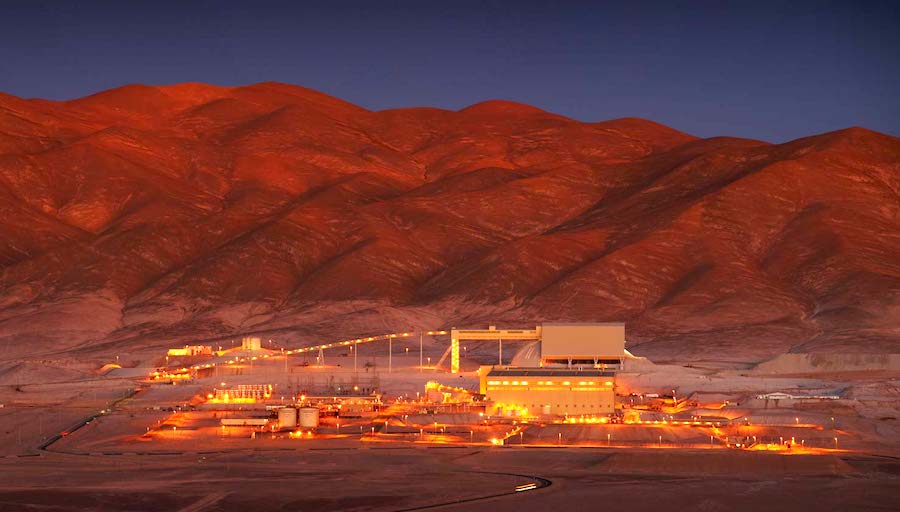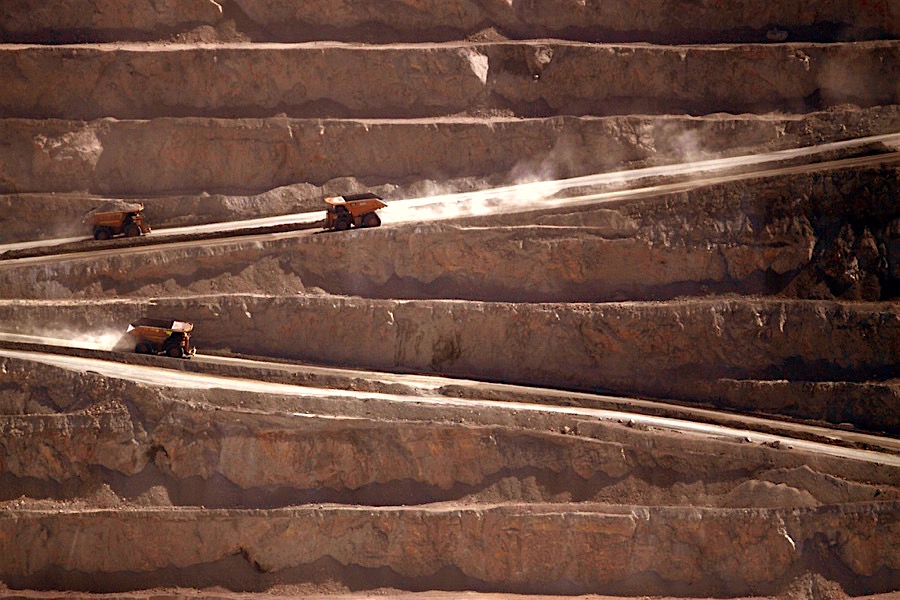Reuters | August 13, 2024 |

Escondida copper mine. (Image courtesy of BHP)
Mining giant BHP said on Tuesday it had started removing workers on strike at its Escondida copper mine in Chile, deepening tensions at the site after a powerful union rejected the company’s latest invitation for talks on pay.

The strike at the world’s largest copper mine was declared hours earlier after negotiations collapsed and could lead to a major hit to production.
“After a new invitation from the company to reach an agreement, Union No. 1 declined to restart talks,” BHP said in a statement, referring to the labor group that represents about 2,400 people.
Escondida, which produced 1.1 million metric tons of copper last year, said the mine was continuing to operate but did not specify how much operations had been scaled down.
BHP said it began removing striking workers when it activated a contingency plan that allows for “minimum services” and for non-union members to keep working.
Mines typically have plans to reduce operations without affecting facilities or equipment.
Workers walked out as they demanded a bigger slice of copper profits, which have been buoyed by recent high prices.
The union maintains it is willing to return to negotiations, and accused BHP of violating strike terms by replacing workers who walked out, who it said were essential to basic operations.
“We demand the company immediately end this grave anti-union practice,” the union said in a statement.
The strike, after the union encouraged members to reject BHP’s offer, has stirred up memories of the last major Escondida walkout in 2017, which hit BHP’s copper production and pushed up global prices of the metal, which is used to make wiring and nearly every single electronic device.
Analysts said the market was so far staying calm, with hopes for a quick resolution and weaker demand from top copper consumer China dampening the impact. BHP’s US-listed shares edged down and copper futures were stable.
“The market is taking it in its stride,” said Chris LaFemina, a metals and mining analyst at Jefferies, though he flagged the potential for the strike to encourage other labor disputes in Chile.
“If you get a series of mine disruptions, that can have an impact on the market.”
London-listed shares of BHP and copper prices each fell less than 1% on Tuesday.
Workers from one of three unions at Lundin Mining’s Caserones copper mine in Chile also went on strike on Tuesday over failed pay negotiations.
While the Escondida strike is unlikely to affect Caserones, the outcome could influence future negotiations at other mines, said Benchmark Mineral Intelligence, a UK-based provider of critical minerals pricing and data.
They also noted that Escondida processes 400,000 tons of ore a day, a pipeline that could be disrupted shortly after workers walk out.
BHP offered a $28,900 bonus per worker, compared with the union’s demand of 1% of shareholder dividends for the mine, which would amount to roughly $36,000.
“We made every responsible effort to reach an agreement, but that wasn’t possible,” the union said in a statement ahead of the strike’s start at 8 a.m. (1200 GMT).
Four proposals
BHP defended its contract as one of the best in the industry, and said it had offered four proposals in response to points raised by the union. The labor group “on the last day of mediation presented new requirements,” BHP said in a statement.
BHP, one of the world’s biggest miners, owns more than half of Escondida in northern Chile, along with Rio Tinto and JECO Corp.
Rio Tinto declined to comment. Representatives for Mitsubishi, the controlling shareholder in JECO, were not immediately available.
Some 60% to 70% of Escondida’s copper concentrates are shipped to China, a source with knowledge of the matter said. A cutoff of Escondida concentrates could hit supply chains of Chinese smelters, which produce half the world’s refined copper.
Union President Patricio Tapia told Reuters previously that a strike would see BHP unable to produce copper, because replacement workers are prohibited by law.
Along with seeking higher pay, the union, which has repeatedly clashed with BHP, is pressing for better conditions for workers who lose their jobs due to outsourcing and automation as well as health benefits, bonuses and more.
(By Fabian Cambero, Julian Luk, Ernest Scheyder, Alex Villegas and Daina Beth Solomon; Editing by Mark Potter, David Holmes, Leslie Adler, Jonathan Oatis and Sonali Paul)
BHP workers at top copper mine go on strike after talks fail
By James AttwoodAugust 13, 2024

By James AttwoodAugust 13, 2024

Bars of copper in a storage area at the Valjaonica Bakra Sevojno AD copper mill in Sevojno, Serbia, on Tuesday, Oct. 26, 2021. (Oliver Bunic/Bloomberg)
(Bloomberg) -- Workers at BHP Group’s Escondida mine in Chile will begin a strike Tuesday after failing to reach a wage agreement, setting the stage for a stoppage at the world’s biggest copper operation.
The union’s 2,400 members will down tools at 8 a.m. Chile time after rejecting BHP’s proposal for a new three-year labor contract following five days of mediated talks, the union said in a statement.
The action will halt an operation that accounts for about five per cent of all the world’s mined copper, disrupting shipments for Melbourne-based BHP, while potentially easing pressure on copper futures that have slumped in recent months along with dimming prospects for the global economy.
Escondida churns out more than 1 million metric tons a year, making it by far the biggest supplier of copper. Some analysts see BHP Group overtaking Codelco this year as the top global copper producer.
While collective bargaining in Chile is often marked by brinkmanship and last-minute agreements, Escondida has been the scene of lengthy stoppages in the past, including a 44-day strike in 2017.
BHP didn’t immediately provide a comment.
Benchmark copper traded in London surged to record levels in May as bullish investors placed bets on shortages. That emboldened unions seeking a share of the windfall for their members. But prices have since pulled back by roughly 19 per cent, undermining some of that leverage as companies look to avoid big increases in fixed costs in a cyclical and capital-intensive business.
Still, negotiations come at a time of global tightness of copper concentrate — the raw material produced at Escondida and used to feed smelters — even though the market for refined metal is well supplied for now.
On the final day of mediated talks, BHP had offered a signing bonus of 27 million pesos (US$28,900) per worker, as well as improvements in benefits. Workers had sought a bonus of more than 30 million pesos and a share of profit.
With assistance from Matthew Malinowski
(Bloomberg) -- Workers at BHP Group’s Escondida mine in Chile will begin a strike Tuesday after failing to reach a wage agreement, setting the stage for a stoppage at the world’s biggest copper operation.
The union’s 2,400 members will down tools at 8 a.m. Chile time after rejecting BHP’s proposal for a new three-year labor contract following five days of mediated talks, the union said in a statement.
The action will halt an operation that accounts for about five per cent of all the world’s mined copper, disrupting shipments for Melbourne-based BHP, while potentially easing pressure on copper futures that have slumped in recent months along with dimming prospects for the global economy.
Escondida churns out more than 1 million metric tons a year, making it by far the biggest supplier of copper. Some analysts see BHP Group overtaking Codelco this year as the top global copper producer.
While collective bargaining in Chile is often marked by brinkmanship and last-minute agreements, Escondida has been the scene of lengthy stoppages in the past, including a 44-day strike in 2017.
BHP didn’t immediately provide a comment.
Benchmark copper traded in London surged to record levels in May as bullish investors placed bets on shortages. That emboldened unions seeking a share of the windfall for their members. But prices have since pulled back by roughly 19 per cent, undermining some of that leverage as companies look to avoid big increases in fixed costs in a cyclical and capital-intensive business.
Still, negotiations come at a time of global tightness of copper concentrate — the raw material produced at Escondida and used to feed smelters — even though the market for refined metal is well supplied for now.
On the final day of mediated talks, BHP had offered a signing bonus of 27 million pesos (US$28,900) per worker, as well as improvements in benefits. Workers had sought a bonus of more than 30 million pesos and a share of profit.
With assistance from Matthew Malinowski
Union at BHP’s Escondida mine says company made ‘illegal’ offer amid negotiations
Reuters | August 12, 2024 |

Escondida mine, Chile. (Image courtesy of Municipalidad Antofagasta | Flickr )
The union representing workers at BHP’s Escondida mine in Chile told its members on Monday that it would accuse the company of “anti-union practices” for making a contract offer outside of a government-mandated mediation process.

The company and the powerful workers’ union have been in a five-day period of government mediation, due to expire at midnight on Monday, aimed at preventing a strike after workers overwhelmingly rejected a previous contract offer from BHP during a formal negotiation period.
In an internal memo to members seen by Reuters, the union said that BHP made an offer to union members on Monday afternoon “in an illegal manner” as negotiations were ongoing.
“The company has spread this offer to the workers without previously presenting it, as it should, to the Union Negotiating Commission,” the memo said.
“The maneuver … shows a clear bad faith on part of the company,” the memo added.
The company’s offer on Monday included a bonus equivalent to about $28,900 per union member, according to a source close to the negotiations, who declined to be named due to their private nature.
BHP did not respond to a request for comment.
Company and union representatives were due to meet at 6:30 p.m. local time (2230 GMT) on Monday in the northern Chilean city of Antofagasta.
(By Fabian Cambero and Brendan O’Boyle; Editing by Anthony Esposito and Jamie Freed)
Reuters | August 12, 2024 |

Escondida mine, Chile. (Image courtesy of Municipalidad Antofagasta | Flickr )
The union representing workers at BHP’s Escondida mine in Chile told its members on Monday that it would accuse the company of “anti-union practices” for making a contract offer outside of a government-mandated mediation process.

The company and the powerful workers’ union have been in a five-day period of government mediation, due to expire at midnight on Monday, aimed at preventing a strike after workers overwhelmingly rejected a previous contract offer from BHP during a formal negotiation period.
In an internal memo to members seen by Reuters, the union said that BHP made an offer to union members on Monday afternoon “in an illegal manner” as negotiations were ongoing.
“The company has spread this offer to the workers without previously presenting it, as it should, to the Union Negotiating Commission,” the memo said.
“The maneuver … shows a clear bad faith on part of the company,” the memo added.
The company’s offer on Monday included a bonus equivalent to about $28,900 per union member, according to a source close to the negotiations, who declined to be named due to their private nature.
BHP did not respond to a request for comment.
Company and union representatives were due to meet at 6:30 p.m. local time (2230 GMT) on Monday in the northern Chilean city of Antofagasta.
(By Fabian Cambero and Brendan O’Boyle; Editing by Anthony Esposito and Jamie Freed)
No comments:
Post a Comment